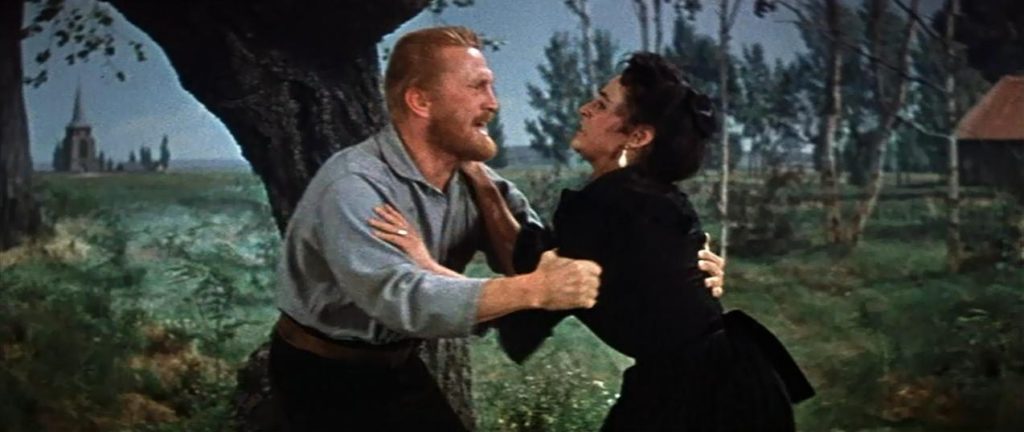Kirk Douglas, Superstar
By • February 6, 2020 0 950

I had occasion to see, and meet, Kirk Douglas, one of the most powerfully affecting movie stars ever, only once in my life. It was a memorable occasion.
I don’t remember the exact date or year, but Douglas — who made his mark as a rage-filled boxer in the 1949 film “Champion” and was a star ever since — had suffered a stroke in 1996, leaving him with a temporary inability to speak, a severe bout of depression and a permanent small speech defect.
In 2012, he had written a book about the stroke, called “My Stroke of Luck.” There was a banquet in his honor at the National Press Club at which he was to talk about his experience and the book, accompanied by Washington Post humorist and columnist Art Buchwald and Jack Valenti, president of the Motion Picture Association of America.
People — many of them women who had been teens when Douglas brandished his sex appeal in numerous and unforgettable films — were waiting anxiously at dinner tables, tapping their fingers.
Valenti came up to the microphone. “Thank you for your patience,” he said. “Now, the moment you’ve been waiting for.
“Ladies and gentlemen,” he said, pausing. “I give you … SPARTACUS!”
The people there jumped to their feet, applauding loudly. You could hear sighs escape. Loudly.
Douglas (in a tux, not a toga, as I recall) walked not all that slowly to the dais. White-haired, smiling, grinning that just-above-the-dimpled-chin, full-toothed smile, he told the story of his stroke, how he couldn’t remember how to let the dog out, how he was helpless on the floor.
Buchwald, a friend, said that he was here to remind Douglas that he “wasn’t the only guy to ever have a stroke.”
What a fuss, what a noise, what a star. What drama!
Douglas, the man of many parts, but always one part, too, died yesterday, Feb. 5, at the age of 103. That’s one hundred and three. There was no fuss; he passed away in Beverly Hills, surrounded by family and friends. It was, by all accounts, a quiet passing.
In Hollywood, when a legend dies, it is not a passing or an end. It’s a celluloid resurrection, a rising, a memory for those left behind — like sons and wife and friends and grandkids, to be sure, but also like you and me.
That’s why God made YouTube and Wikipedia: to account for the movie stars in the time of our ilves, as well as theirs. They said he made some 90 movies, most of them pretty good, quite a few more damn good and a number just plain exceptional and unforgettable.
Not a bad record for a guy who started out life on Dec. 9, 1916, as Issur Danielovitch, the son of an immigrant rag seller from Russia. Makes you wonder, when was the last time somebody called him Issur? In “Champion,” the embattled and battling boxer that Douglas played said he was tired of being called “this guy.” He said, “I want to hear people call me Mister.”
That’s what I called him when I met him at the Press Club, as in, “Thank you, Mr. Douglas,” after he let me take a picture or two of him.
By his own admission, he wasn’t a nice guy. “I’m not modest. I guess you could say I’m an S.O.B.” And, according to accounts, he was always intense, not always faithful and super-smart. “Kirk was intelligent,” one writer said of him.
And, it should be noted, brave. The screenwriting credit for “Spartacus” went to Dalton Trumbo, who had been blacklisted by Hollywood for years for his political affiliations and views.
He also took a chance on Stanley Kubrick to direct “Paths of Glory” and “Spartacus.” “Glory,” which Douglas produced, to this day remains one of the greatest antiwar movies ever made, concerning the court-martial of French soldiers for cowardice during the battle of the Somme. Douglas played the courageous Colonel Dax, who tries to defend the men and buck the French military establishment.
But take a look.
A legendary Hollywood producer — twice — in “The Bad and the Beautiful” and “Two Weeks in Another Town,” an out-of-time and out-of-luck modern cowboy in “Lonely Are the Brave,” a rousing Viking warrior in, what else, “The Vikings.” Teaming up with Burt Lancaster (not for the last time) in “Gunfight at the O.K. Corral” as Doc Holliday to Burt’s Wyatt Earp, playing another lawyer in “Town Without Pity,” the cynical reporter-hustler in the great “Ace in the Hole,” Ned the singing sailor in the Disney spectacle of Jules Verne’s “Twenty Thousand Leagues Under the Sea” and the coup-and-conspiracy spurred “Seven Days in May.”
And then, in 1956, there was “Lust for Life,” in this writer’s view the best movie ever made about an artist. Part of that is due to director Vincente Minnelli’s stunning palette, sets that looked like paintings by the master Vincent van Gogh, Anthony Quinn’s savage portrait of Gauguin and, most of all, a rounded, poignant, deeply dug, naked and heartbreaking performance by Douglas as van Gogh.
And then there was and is Anne Buydens, his wife of over 60 years who survives him, and his four sons, including Michael, who won an Oscar for “Wall Street.”
And then there was, you know, ladies and gentlemen and those waiting patiently at the gate: Spartacus.
Also known as Issur Danielovitch, the ragman’s son.
Also known as Kirk Douglas, Superstar.

